Environmental Justice Debated
Air Date: Week of October 23, 2020
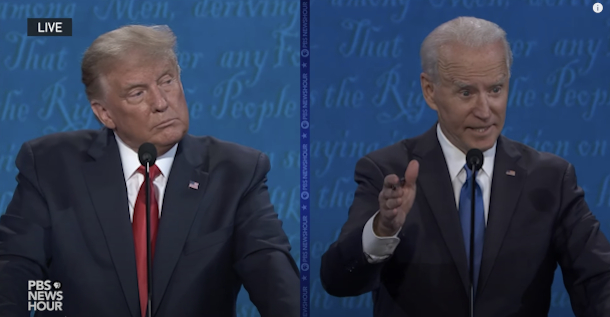
During the final presidential debate of the 2020 election, Joe Biden talked about his $2 trillion climate plan and getting the U.S. back into the Paris Climate Accord, while Donald Trump blamed countries like China, Russia, and India for “filthy air.” (Photo: PBS NewsHour debate coverage screenshot)
The second and final 2020 U.S. presidential debate featured climate and the environment more prominently than ever before in a general election debate, with environmental justice discussed for the first time in such a forum. Hosts Steve Curwood and Bobby Bascomb talk about some of the debate highlights on environmental topics, from “fenceline communities” plagued by pollution, to Donald Trump’s claims about wind energy, to Joe Biden’s plan to phase out fossil fuels.
Transcript
BASCOMB: From PRX and the Jennifer and Ted Stanley Studios at the University of Massachusetts Boston, this is Living on Earth, I’m Bobby Bascomb.
CURWOOD: And I’m Steve Curwood.
Well Bobby, the second and final live Presidential debate before the elections once again touched on the climate crisis, and broke some new ground on environmental justice.
BASCOMB: Yes Steve, and nothing like a mute button and a strong moderator to make it possible to hear those points.
CURWOOD: So let’s listen to some excerpts of the debate, starting when Joe Biden pointed to quote good paying jobs unquote in the wind and solar industries, and the rapid growth of solar. Donald Trump had a sharp retort short on facts.
TRUMP: I know more about wind than you do. It's extremely expensive. Kills all the birds. It's very intermittent. It's got a lot of problems and they happen to make the windmills in both Germany and China and the fumes coming up, if you're a believer in carbon emission, the fumes coming up to make these massive windmills is more than anything that we're talking about with natural gas, which is very clean. One other thing, solar-
BIDEN: Find me a scientist who says that.
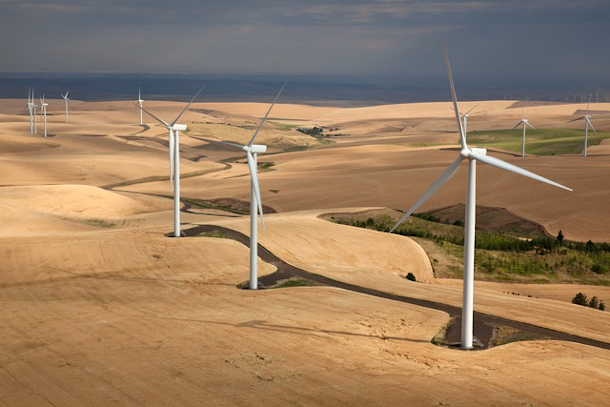
President Trump attacked wind energy as “extremely expensive” and “very intermittent” and falsely claimed that wind turbine production creates more carbon emissions than using natural gas to generate electricity. (Photo: Jeffrey G. Katz, Wikimedia Commons CC BY-SA 3.0)
BASCOMB: Well, in fact president Trump’s own scientists in US fish and Wildlife service says the bird deaths from collisions with wind turbines are a tiny fraction of birds killed by cats, as well as collisions with buildings and power lines.
CURWOOD: And then after some back and forth on fracking moderator Kristen Welker brought up a topic never heard before in general presidential election debate, environmental justice.
WELKER: President Trump, people of color are much more likely to live near oil refineries and chemical plants. In Texas, there are families who worry the plants near them are making them sick. Your administration has rolled back regulations on these kinds of facilities. Why should these families give you another four years in office?
TRUMP: The families that we're talking about are employed heavily and they are making a lot of money, more money than they've ever made. If you look at the kind of numbers that we've produced for Hispanic, for Black, for Asian, it's nine times greater the percentage gain than it was under in three years than it was under eight years of the two of them to put it nicely, nine times more. Now somebody lives, I have not heard the numbers or the statistics that you're saying, but they're making a tremendous amount of money. Economically, we saved it and I saved it again a number of months ago, when oil was crashing because of the pandemic. We saved it. Say what you want about relationship. We got Saudi Arabia, Mexico and Russia to cut back, way back. We saved our oil industry and now it's very vibrant again and everybody has very inexpensive gasoline. Remember that.
WELKER: Vice President Biden, your response and then we're going to have a final question for both of you.
BIDEN: My response is that those people live on what they call fence lines. He doesn't understand this. They live near chemical plants that in fact, pollute, chemical plants and oil plants and refineries that pollute. I used to live near that when I was growing up in Claymont, Delaware and there are more oil refineries in Marcus Hook and the Delaware River than there is any place, including in Houston at the time. When my mom get in the car and when there are first frost to drive me to school, turning the windshield wiper, there'd be an oil slick in the window. That's why so many people in my state were dying and getting cancer. The fact is those frontline communities, it's not a matter of what you're paying them. It matters how you keep them safe. What do you do? And you impose restrictions on the pollutions that if the pollutants coming out of those fence line communities.
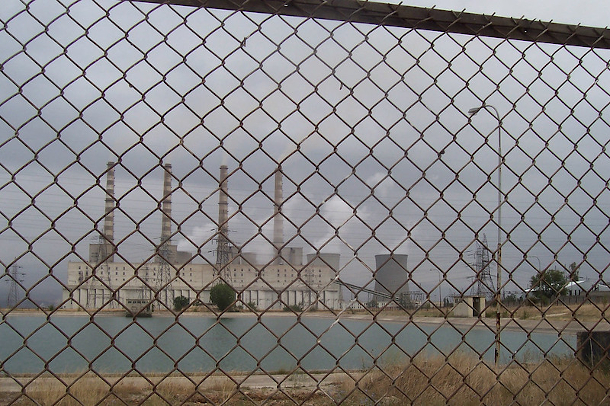
In his response to the moderator’s question on environmental justice, Joe Biden talked about the “fenceline communities” who face harmful pollution from nearby industries. (Photo: photos.de.tibo, Flickr CC BY-NC-ND 2.0)
BASCOMB: There was far less interrupting during this debate compared to the last one, but there was plenty of jabbing nonetheless.
WELKER: Okay. I have one final question called.
TRUMP: Would he close down the oil industry?
WELKER: It falls-
TRUMP: Would you close down the oil industry?
BIDEN: By the way, I have a transition from the old industry, yes.
TRUMP: Oh, that's a big statement.
BIDEN: I will transition. It is a big statement.
TRUMP: That's a big statement.
BIDEN: Because I would stop.
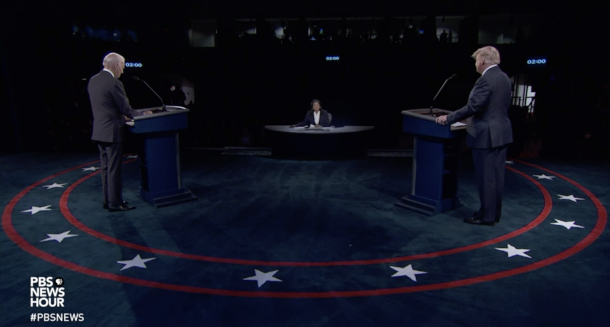
From left, Democratic Nominee for President Joe Biden, moderator Kristen Welker, and President Donald Trump on the debate stage. (Photo: PBS NewsHour debate coverage screenshot)
WELKER: Why would you do that?
BIDEN: Because the oil industry pollutes, significantly.
TRUMP: Oh, I see. Okay.
BIDEN: Here's the deal-
TRUMP: That's a big statement.
BIDEN: Well if you let me finish the statement, because it has to be replaced by renewable energy over time, over time, and I'd stop giving to the oil industry, I'd stop giving them federal subsidies. You won't give federal subsidies to the gas, oh, excuse me to solar and wind.
TRUMP: Yeah.
BIDEN: Why are we giving it to oil industry?
TRUMP: We actually do give it to solar and wind. That's maybe the biggest statement. In terms of business, that's the biggest statement.
WELKER: Okay.
TRUMP: Because basically what he's saying is-
WELKER: We have one final question, Mr. President.
TRUMP: ... he is going to destroy the oil industry. Will you remember that Texas? Will you remember that Pennsylvania, Oklahoma?
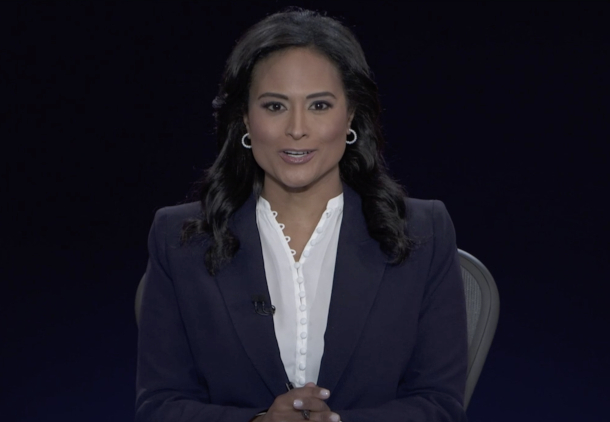
NBC anchor Kristen Welker was widely praised for her skillful handling of the second debate between Donald Trump and Joe Biden. (Photo: PBS NewsHour debate coverage screenshot)
WELKER: Okay, Vice President Biden, let me give you 10 seconds. Okay.
WELKER: Vice President Biden, let me give you 10 seconds to respond-
TRUMP: Ohio.
WELKER: ... and then I have to get to the final question. Vice President Biden.
BIDEN: He takes everything out of context, but the point is, look, we have to move toward net zero emissions. The first place to do that by the year 2035 is in energy production, by 2050 totally.
CURWOOD: Bobby, for me the takeaway from this second debate is the new place climate change has on the list of public priorities. It’s not if but what to do. And I think it’s fair to say whichever man wins this election pressure will be on to fight climate disruption.
Links
Grist | “Biden Schools Trump on Environmental Justice During Debate”
Learn more from NAACP about the harmful pollution fenceline communities experience
Carbon Brief on the “insignificant” carbon footprint of wind energy compared with gas
Living on Earth wants to hear from you!
Living on Earth
62 Calef Highway, Suite 212
Lee, NH 03861
Telephone: 617-287-4121
E-mail: comments@loe.org
Newsletter [Click here]
Donate to Living on Earth!
Living on Earth is an independent media program and relies entirely on contributions from listeners and institutions supporting public service. Please donate now to preserve an independent environmental voice.
NewsletterLiving on Earth offers a weekly delivery of the show's rundown to your mailbox. Sign up for our newsletter today!
 Sailors For The Sea: Be the change you want to sea.
Sailors For The Sea: Be the change you want to sea.
 The Grantham Foundation for the Protection of the Environment: Committed to protecting and improving the health of the global environment.
The Grantham Foundation for the Protection of the Environment: Committed to protecting and improving the health of the global environment.
 Contribute to Living on Earth and receive, as our gift to you, an archival print of one of Mark Seth Lender's extraordinary wildlife photographs. Follow the link to see Mark's current collection of photographs.
Contribute to Living on Earth and receive, as our gift to you, an archival print of one of Mark Seth Lender's extraordinary wildlife photographs. Follow the link to see Mark's current collection of photographs.
 Buy a signed copy of Mark Seth Lender's book Smeagull the Seagull & support Living on Earth
Buy a signed copy of Mark Seth Lender's book Smeagull the Seagull & support Living on Earth

